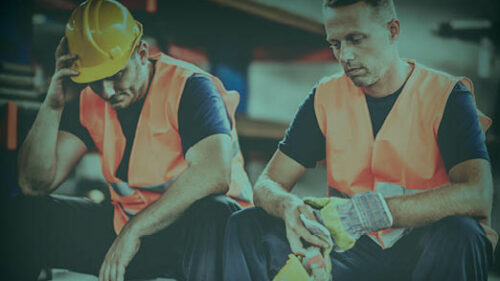Construction workers are known for being tough and strong willed in the face of challenges. Over my many years in construction, I’ve appreciated the strength and stoicism of tradespersons confidently accepting a gauntlet thrown down to achieve a schedule, sequence, or safety production milestone.
An image I have often seen is of stone-faced workers showing no emotions regardless of the circumstance. Through the expressionless looks, they seem to be saying “game on – challenge accepted.” I wonder what they’re really thinking deep down underneath the determined, steely-eyed looks.
What Is behind our Emotional Masks?
I grew up in Wisconsin, and my favorite winter pastime was playing hockey. I still enjoy the sport, and it is what I’ve missed most during COVID-19. I still remember the iconic “scar face” goalie mask worn by Boston Bruins Gerry Cheevers on which he added a new set of painted surgical stitches every time he took a shot to the face. His mask protected him from the real danger of flying pucks.
Similarly, wearing face coverings during COVID-19 has become a reality at work. These masks offer protection from the transmission of disease. These face coverings also afford a degree of self-expression.
I live in a suburb of Seattle and enjoy adorning a Green Bay Packers face mask covering when I am out in public. Of course, I’m inviting, expecting, and even enjoying some banter by showing loyalty to my real home team. If I wore a Seattle Seahawks mask, it merely would be to fit in, gain social acceptance, and receive positive compliments on my apparent team of choice. In my case, it would also not be real. Yes, I respect the club as an NFC rival, and I legitimately like quarterback Russell Wilson. But, if I wore a Seahawks face covering, I’d be masking my true feelings and I would not be real to myself or to others.
We’ve likely all heard the expression wearing emotional masks. When we wear emotional masks, we are similarly seeking protection by disguising our real feelings. We’re projecting that everything is fine even when it is not.
Some of us wear masks to block out the pain of sadness, disappointment or disillusionment with our lives. Some of us wear masks to pretend to be someone or something that we are not, possibly to compensate for some perceived shortcoming. Some of us wear masks because we fear rejection or that others will not like or respect the real us. Some wear masks because we never learned to be comfortable with who we are perhaps to cover feelings of shame or embarrassment.
It’s Okay to Not Be Okay
Removing emotional masks requires honesty and vulnerability. A major benefit of taking off our emotional masks is being honest with our self and others. It is exhausting to keep up the appearance that everything is fine knowing deep down that it is not.
Rick Warren, author of the book The Purpose-Driven Life, said “wearing a mask wears you out. Faking it is fatiguing. The most exhausting activity is pretending to be what you know you aren’t.”
Removing one’s emotional mask is a journey of gut-wrenching self-discovery that begins with honesty and vulnerability. Author Alan Moore explains “you wear a mask for so long, you forget who you were beneath it.”
When we accept ourselves as imperfect people in an imperfect world, we can accept the need for personal growth and development. The best path to personal growth is to take off the emotional masks you’ve been wearing. The first step to becoming a more authentic person is recognizing the emotional mask you’re wearing. Understand why the mask was being worn, and acknowledge that the mask served its purpose of protecting you.
So, let’s all start today and remove the mask…and in the process, “make it OK to not be OK”!
P.S. If you missed the first three parts of this “The Invisible Crisis” blog series, I encourage you to check them out.
And, in the meantime (or at any time, for that matter), don’t hesitate to reach out to CSDZ or the CIASP. We’d love to talk with you about this topic and begin moving the construction industry in the direction of physical AND emotional/mental wellbeing.







